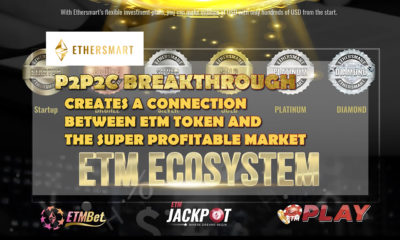News
TrueUSD Names Five Banks Holding the Stablecoin’s USD Reserve

| 1. TUSD is currently in collaboration with five banks. 2. Partner banks provide a safeguard for TUSD’s asset security. 3. TUSD is now audited by auditing firm Armanino. |
Stablecoin TrueUSD (TUSD) named five of its current bank collaborators that ensure asset security for its USD reserves.
According to TUSD, it currently works with Signature Bank, Silvergate Bank, Prime Trust, First Digital Trust, and BitGo for the safekeeping of USD assets that back the value of the stablecoin.
For one, Signature Bank is the first bank insured by the Federal Deposit Insurance Corporation (FDIC) to launch a blockchain-based digital payments platform—Signet.
TUSD partnered with Signature Bank, a New York-based commercial firm, and was then integrated into Signet, Signature’s payment network, opening 24/7 minting services within two minutes. TUSD admitted that this development “greatly” improved its financial services for its users. Interestingly, TUSD transactions within Signet are free.
Another TUSD partner bank from 2021 is Silvergate. This financial firm became one of the first banks to set up accounts for crypto transactions and has since become known as one of the few crypto-friendly banks.
TUSD leverages the Silvergate Exchange Network (SEN), providing users with another “efficient” token minting service.
Together with SEN, TUSD reinforces its near-instant minting and redemption services with Prime Trust’s PrimeX. PrimeX enables TUSD holders to mint and redeem tokens round the clock, offering instant settlements.
Users of the stablecoin can also mint and redeem their tokens with TUSD partner First Digital Trust. Although the bank implements minimum and maximum transactions, TUSD saw this as an opportunity to provide its users with options, especially if they plan on minting or redeeming small amounts of TUSD.
TUSD is also one of the early stablecoins that crypto custodian BitGo included in its offerings. BitGo’s secure multi-signature wallets allow TUSD users to purchase the stablecoin within the wallet.
With BitGo, users can purchase and exchange TUSD with no fee. However, a minimum amount of $1,000 worth of TUSD is required to mint and redeem.
TUSD revealed that it is exploring more ways to better its services for its users. To do so, it plans to forge relationships with more bank partners.Earlier, TUSD was reported to now be audited by Armanino, a top European auditing firm. Armanino will attest to the stability of TUSD’s smart contracts on-chain. TUSD, in turn, becomes the only stablecoin that has implemented such security standards.
News
Think You Missed the Meme Coin Boom? Troller Cat’s Presale Could Be Your Snek Momen

Those who enter early in the crypto market often see the biggest rewards. Just take a look at what happened with Snek. What started as a meme quietly gained massive traction and skyrocketed. By the time most investors noticed, the real profits had already been booked. But crypto doesn’t hit pause. A new meme coin is heating up the presale circuit and clawing for attention—Troller Cat ($TCAT).
The Troller Cat presale is live, and it’s purring with power. With over 12 00 holders and more than $225,000 raised, this isn’t just another meme coin—it’s a full-blown Web3 character universe backed by utility, humor, and a feral roadmap. If you missed Snek, this might be your redemption play.
Let’s break down why Troller Cat could be your breakout win of 2025.
Troller Cat: The Meme Coin Redemption Arc Everyone’s Talking About
If you fumbled the Snek play, this is your second chance—and this time, the claws are out. Troller Cat is not just another meme coin riding the hype wave. It’s gamified, edgy, and building a unique brand identity that stands out in a crowded field.

Why investors are racing into the Troller Cat frenzy:
- Stage 10 is live, with a token price of $0.00003684
- Launch price locked at $0.0005309 – that’s a 1300% potential ROI
- Over 1,200 holders, growing daily
- No minimum buy-in, only $25 minimum if using a referral code
- Next stage brings a 35.01% price increase – don’t blink.
Every presale stage unlocks a new troll-themed character, turning the community into an interactive, meme-powered storyline. Troller Cat is fully audited, KYC verified, and focused on building long-term value, not short-term hype.
Stake and Earn: Passive Gains with 69% APY
Troller Cat’s staking program dishes out a generous 69% APY during the presale, giving loyal holders a real reason to stick around. It’s not just about memes—it’s about making your tokens work for you. By locking in their coins, users can earn steady returns while supporting the project’s long-term stability.
Unlike many high-yield systems that risk flooding the market, Troller Cat’s staking model is crafted to be sustainable, rewarding commitment without triggering inflation. It strikes a smart balance between engagement and ecosystem health. As rewards are automatically distributed, holders can relax, troll on, and watch their stack grow—no effort needed, just gains.
Snek: The Meme Coin You Wish You Bought Earlier
Snek wasn’t just a quirky frog-themed meme—it became a full-fledged crypto cult. What started as a playful token quickly gained viral traction, sending early backers into a profit frenzy. Its low-cap entry point gave room for major upside, and it delivered.
Snek’s formula was clear: meme energy + early momentum = massive ROI. But the vast majority only heard about it once it was trending. By the time influencers were posting about it, the whales had already cashed out.
Snek became a harsh reminder of how fast opportunities vanish in crypto.

Final Thoughts: Troller Cat Might Just Be 2025’s Breakout Crypto Star
The meme coin cycle is merciless—either you act early, or you become someone else’s exit liquidity. While Snek made waves, Troller Cat is creating a tsunami. With real utility, a growing holder base, deflationary mechanics, and a fully gamified experience, this project has claws—and it’s scratching at the door of breakout stardom.
Presale prices are still low, but the next jump is coming fast. With over 1341% ROI potential from today’s price to launch, now is the time to pounce.

For More Information:
Website: https://www.trollercat.io/
Buy Now: https://www.trollercat.io/buy-now/
Frequently Asked Questions
1. What is the current stage of the Troller Cat presale?
The presale is in Stage 10, with a price of $0.00003684. Over $225,000 has been raised with more than 1,200 holders.
2. What’s the expected ROI if I join now?
Buying in now at Stage 10 offers a potential ROI of 1300% if held until launch at $0.0005309.
3. Is Troller Cat just another meme token?
No. Troller Cat features 69% APY staking, a P2E Game Center, and deflationary tokenomics—built for fun and function.
4. Is the project safe?
Yes. KYC verification and a full smart contract audit ensure transparency and investor security.
5. How do I participate?
Go to Troller Cat’s site, connect your wallet, and buy. No minimum required—except $25 if using a referral.
Glossary of Key Terms
- Presale: Early buying phase where tokens are sold before the official public launch.
- ROI (Return on Investment): Percentage profit earned based on your original investment amount.
- APY (Annual Percentage Yield): Yearly return percentage on staked tokens, compounding over time.
- Deflationary Token: A token with a decreasing supply over time, helping to increase scarcity and value.
- Staking: Locking tokens into a platform to earn passive rewards or interest over time.
- P2E (Play-to-Earn): Earning cryptocurrency by playing blockchain-based games or completing in-game tasks.
- KYC (Know Your Customer): A verification process requiring personal identification to ensure transparency.
- Smart Contract Audit: A thorough code review to detect vulnerabilities and confirm the contract’s security.
- Token Holder: An individual or entity that owns and holds a specific cryptocurrency token.
- Launch Price: The first official trading price when a token hits public exchanges or markets.
News
BlockDAG’s 25x Presale Ends June 24 as Bitcoin Cash (BCH) Price Surge & ONDO Whale Action Drive 2025 Watchlist

Is the recent Bitcoin Cash (BCH) price surge a real trend or just another temporary spike? And what’s fueling the renewed interest in ONDO whale action? These shifts are drawing interest, especially from those following the top crypto coins 2025. While BCH and ONDO show short-term momentum, BlockDAG is gaining attention for something else entirely, practical delivery.
This presale isn’t just another offer, it’s a time-sensitive opportunity. Priced at $0.0020, BDAG is just days away from a 50% price increase set for June 24. With over $318 million raised and more than 23 billion units sold, this isn’t just noise. The X1 app already supports mining from over 2 million mobile users, and a U.S. sponsorship reveal expected on June 30 has the crypto community on alert. BlockDAG isn’t pitching an idea, it’s releasing a functional product. At this stage, the question isn’t if it will move, but who gets in before the next stage begins.
BlockDAG Nears Price Jump with Real-World Use & Growing Traction
BlockDAG isn’t relying on speculation, it’s delivering outcomes. The presale has pulled in more than $318 million with 23 billion units sold, making the $0.0020 price point more than just a figure, it’s a deadline. That price will climb to $0.0030 on June 24, and the projected listing price of $0.05 points to a 25x potential gain. What sets it apart is the working utility even before marketing efforts fully launch.
The X1 mobile app now supports over 2 million miners, while the X30 and X100 hardware devices are scheduled to ship in July, with the X10 set for August. Security remains a top priority, with Halborn’s audit complete and CertiK currently reviewing the project. Confirmed listings on MEXC, LBANK, BitMart, CoinStore, and XT.com reinforce that this project isn’t just planning, it’s executing.
The market is also watching for a potential shift on June 30 when a U.S. sponsorship announcement is expected. Some call it the “Binance moment” of this cycle, where proven utility could gain wide exposure. If the announcement follows the June 24 price jump, those already holding at $0.0020 could find themselves in the strongest position.
BlockDAG is earning recognition not for speculation, but for output. With live infrastructure and expanding awareness, it’s being recognized among the top crypto coins 2025. Those looking for early-stage growth with working features might not get another entry like this before the next batch is priced.
Bitcoin Cash (BCH) Price Surge Gains Traction as Traders Reassess Targets
The Bitcoin Cash (BCH) price surge is becoming a key talking point in late June after a sharp 9% jump on June 21 brought it past the $420 mark. That move briefly pushed BCH ahead of Litecoin (LTC) in market cap and renewed interest in one of the most prominent Bitcoin forks. Traders are now watching the $440–$460 level as a potential next breakout zone, especially if volume keeps building.
The buzz around BCH is partly tied to rising expectations of wider adoption in merchant payments, with some utility announcements rumored to arrive soon. The coin is also moving in step with broader Bitcoin-linked gains, as BTC continues to hold near $66,000. While BCH hasn’t revisited its past highs, its steady momentum and higher trading volume have brought it back onto the radar of active traders going into Q3.
ONDO Whale Action Signals Confidence & Future Potential
Recent ONDO whale action has drawn market interest, with one major wallet acquiring 1.65 million ONDO tokens worth over $1.7 million. This buy occurred while ONDO traded in the $1.06–$1.09 range, providing price stability even as broader markets remained uncertain. The wallet involved has a history of purchasing before major rallies, leading to speculation that another price surge could be near.
Beyond this one buy, ONDO is gaining momentum thanks to its connection to tokenized real-world assets. Rumors of new ecosystem partnerships expected by the end of June are helping fuel attention. The token has managed to stay above $1, showing consistent support. Should another whale wallet make a similar move, the price could quickly rise to the $1.20–$1.30 range. Analysts are now tracking wallet movements closely to see if this mirrors ONDO’s last breakout pattern seen in early May.
Closing Thoughts
The Bitcoin Cash (BCH) price surge is hard to ignore after its climb from $360 to nearly $388, and ONDO’s whale activity suggests something bigger could be forming. Both are generating significant interest, but neither offers a discounted entry like BlockDAG.
That’s where BlockDAG sets itself apart. The presale price remains at $0.0020, with hardware already on the way and a confirmed target price of $0.05. The upcoming U.S. sponsorship reveal only adds urgency to an already tight timeline.
For those tracking the top crypto coins 2025, this presale phase isn’t just another early-stage offer, it’s a time-limited window. With fundamentals in place and timelines already rolling, BlockDAG might be the next major move you don’t want to miss.
Presale: https://purchase.blockdag.network
Website: https://blockdag.network
Telegram: https://t.me/blockDAGnetworkOfficial
Discord: https://discord.gg/Q7BxghMVyu
News
Bitcoin Cash Nears $500, Cardano Eyes $0.70, & Web3 ai Rises with $8.3 M Raised & 1,747% ROI Potential

As the crypto market gains momentum in 2025, three standout projects are capturing attention for their bullish crypto setups. Bitcoin Cash (BCH) price performance is gaining strength, trading near $473 after a nearly 10% rise and supported by a surge in Open Interest from $312 million to $485 million, along with an RSI of 66. Meanwhile, the Cardano (ADA) price movement shows a triple bottom near $0.60, with a potential breakout toward $0.70794 if it clears key resistance.
Closing the trio is Web3 ai, which is reshaping crypto trading with multiple integrated AI tools. With $8.3 million raised, a $0.000443 presale price, and a projected ROI of 1,747%, Web3 ai offers unmatched upside in today’s data-driven market.
Bitcoin Cash (BCH) Price Performance Signals Strong Bullish Momentum
The Bitcoin Cash (BCH) price performance is gaining attention as the asset trades around $473, showing resilience despite rising geopolitical tensions. On-chain metrics and derivatives data support a bullish crypto outlook, with Open Interest (OI) surging from $312 million to $485 million since June 13, suggesting increased capital inflow. Meanwhile, the Spot Taker Cumulative Volume Delta (CVD) has turned positive, indicating a dominant buying phase since early May.
BCH recently bounced off its 50-day EMA at $409 and has climbed nearly 10%, breaking above the $459 resistance. The RSI remains strong at 66, and the MACD shows a bullish crossover with rising green bars, both pointing to continued momentum. If this trend holds, BCH could retest its January peak of $500.6 and potentially climb toward $542.50. Current indicators suggest that Bitcoin Cash (BCH) price performance is well-positioned among the most bullish crypto assets this week.
Cardano (ADA) Price Movement Hints at a Bullish Setup
The Cardano (ADA) price movement is showing early signs of a potential reversal, hovering just below the 9-period EMA at $0.62680. A push above this level, followed by a reclaim of the 20-period SMA at $0.63163, could shift sentiment from bearish to bullish. The $0.60 support has held firm, with ADA respecting it multiple times, forming what appears to be a triple bottom pattern, a classic bullish crypto signal.
This base, combined with waning selling pressure and hints of accumulation, strengthens the case for upside. If ADA clears the $0.66 resistance, it may quickly target $0.70794, where the 200-period SMA currently sits. Reaching that zone would mark a significant technical achievement and potentially invite more momentum-driven buyers. Overall, ADA’s setup reflects a cautious yet compelling opportunity for bullish traders watching the market closely.
Web3 ai Signals a Bullish Crypto Shift with Intelligent Trading Tools
Web3 ai is fast becoming a central force in reshaping how traders interact with the crypto market. With its powerful suite of multiple integrated AI tools, the platform offers everything from real-time trade signals and portfolio optimization to scam detection and risk management. These tools are not only user-friendly but are designed to reduce noise and deliver focused, actionable insights, making it easier for both newcomers and experienced traders to stay ahead.
What makes Web3 ai stand out is its ability to pull data from multiple sources, blockchains, exchanges, social media, and news platforms, and process it using advanced machine learning, natural language processing, and neural networks. This multi-layered approach allows users to respond faster to price movements, identify hidden opportunities, and reduce exposure to threats.
With over $8.3 million raised, a presale price of $0.000443, and a projected ROI of 1,747%, Web3 ai is not just gaining momentum, it’s helping define what a bullish crypto ecosystem should look like. As the market grows more data-driven, Web3 ai is leading the charge with tools that empower smarter, faster, and safer decision-making across the Web3 space.
Closing Insights
In 2025’s bullish crypto cycle, a few standout projects are drawing serious attention. The Bitcoin Cash (BCH) price performance remains strong, with BCH trading around $473, nearly 10% higher after bouncing off its 50-day EMA. Rising Open Interest and a solid RSI of 66 support continued momentum.
Meanwhile, the Cardano (ADA) price movement signals a potential reversal, with a triple bottom near the $0.60 support. If ADA reclaims $0.63163 and breaks past $0.66, it could quickly rally toward $0.70794, setting up a compelling breakout scenario.
But the most exciting shift is happening with Web3 ai. With over $8.3 million raised, a presale price of $0.000443, and a projected ROI of 1,747%, Web3 ai is redefining crypto trading. Its AI-powered ecosystem is built for speed, precision, and results, helping traders stay ahead in an increasingly data-driven market. Among all the best bullish crypto plays, Web3 ai is emerging as the project to beat.
Join Web3 ai Now:
Website: http://web3ai.com/
Telegram: https://t.me/Web3Ai_Token
Instagram: https://www.instagram.com/web3ai_token
-

 Crypto3 years ago
Crypto3 years agoCardalonia Aiming To Become The Biggest Metaverse Project On Cardano
-

 Press Release5 years ago
Press Release5 years agoP2P2C BREAKTHROUGH CREATES A CONNECTION BETWEEN ETM TOKEN AND THE SUPER PROFITABLE MARKET
-

 Blockchain5 years ago
Blockchain5 years agoWOM Protocol partners with CoinPayments, the world’s largest cryptocurrency payments processor
-

 Press Release5 years ago
Press Release5 years agoETHERSMART DEVELOPER’S VISION MADE FINTECH COMPANY BECOME DUBAI’S TOP DIGITAL BANK
-

 Press Release4 years ago
Press Release4 years agoProject Quantum – Decentralised AAA Gaming
-

 Blockchain5 years ago
Blockchain5 years agoWOM Protocol Recommended by Premier Crypto Analyst as only full featured project for August
-

 Press Release5 years ago
Press Release5 years agoETHERSMART DEVELOPER’S VISION MADE FINTECH COMPANY BECOME DUBAI’S TOP DIGITAL BANK
-

 Blockchain5 years ago
Blockchain5 years ago1.5 Times More Bitcoin is purchased by Grayscale Than Daily Mined Coins






